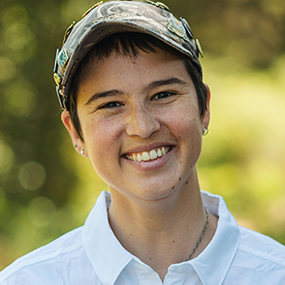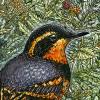

Join BirdNote tomorrow, November 30th!
Illustrator David Sibley and actor H. Jon Benjamin will face off in the bird illustration battle of the century during BirdNote's Year-end Celebration and Auction!
Millicent Ficken spent her career studying bird behavior and communication. The first woman to earn a PhD in Ecology and Evolutionary Biology from Cornell in 1960, Ficken authored over 100 scientific papers. She discovered that male hummingbirds have a whole repertoire of songs rather than just one, outlined the linguistic differences between penguin species, and showed that chickadees take turns singing in the morning. She was especially fascinated by how birds play, showing that bird play almost always has a pressing purpose — they're practicing a skill they need to survive.
BirdNote®
Millicent Ficken Studied How Birds Play
Written by Josephine McRobbie
This is BirdNote.
Millicent Ficken spent her career studying bird behavior and communication. The first woman to earn a PhD in Ecology and Evolutionary Biology from Cornell in 1960, Ficken authored over 100 scientific papers. She discovered that male hummingbirds have a whole repertoire of songs rather than just one, outlined the linguistic differences between penguin species, and showed that chickadees take turns singing in the morning.
[Black-capped Chickadee songs]
She was also fascinated by how birds play together. “Play is one of the most mysterious activities of animals,” Ficken wrote. Her seminal 1997 article “Avian Play” was an exhaustive attempt to categorize these behaviors. One example was the Great Frigatebird, a black seabird with a prominent red throat pouch.
[Waves crashing against the shore]
[Great Frigatebird call]
Ficken noted that young Great Frigatebirds “swoop, pick up, and then drop leaves or other floating objects.” She compared it to a kitten playing with a ball of yarn, and suggested it might help fledglings learn to catch jumping fish, and even steal food from other birds.
Ficken found lots of evidence for avian play. But unlike mammals, who sometimes play purely for fun or social bonding, she showed that bird play almost always has a more pressing purpose — they're practicing a skill they need to survive.
[Great Frigatebird call]
For BirdNote, I’m Ariana Remmel.
###
Senior Producer: John Kessler
Producer: Mark Bramhill
Managing Editor: Jazzi Johnson
Managing Producer: Conor Gearin
Content Director: Jonese Franklin
Bird sounds provided by The Macaulay Library of Natural Sounds at the Cornell Lab of Ornithology, Ithaca, New York. Black-capped Chickadee songs, ML217850561 recorded by Jay McGowan, and Great Frigatebird ML133751911 recorded by Eric DeFonso.
BirdNote’s theme was composed and played by Nancy Rumbel and John Kessler.
© 2023 BirdNote September 2023
Narrator: Ariana Remmel
ID# fickenm-01-2023-09-25 fickenm-01
Reference:
https://academic.oup.com/auk/article/138/2/ukab008/6174658
https://sora.unm.edu/sites/default/files/journals/auk/v094n03/p0573-p05…
https://www.researchgate.net/publication/251672349_Interspecific_variat…
https://www.researchgate.net/publication/228345079_Blue-throated_Hummin…
https://sora.unm.edu/sites/default/files/journals/condor/v089n03/p0500-…





